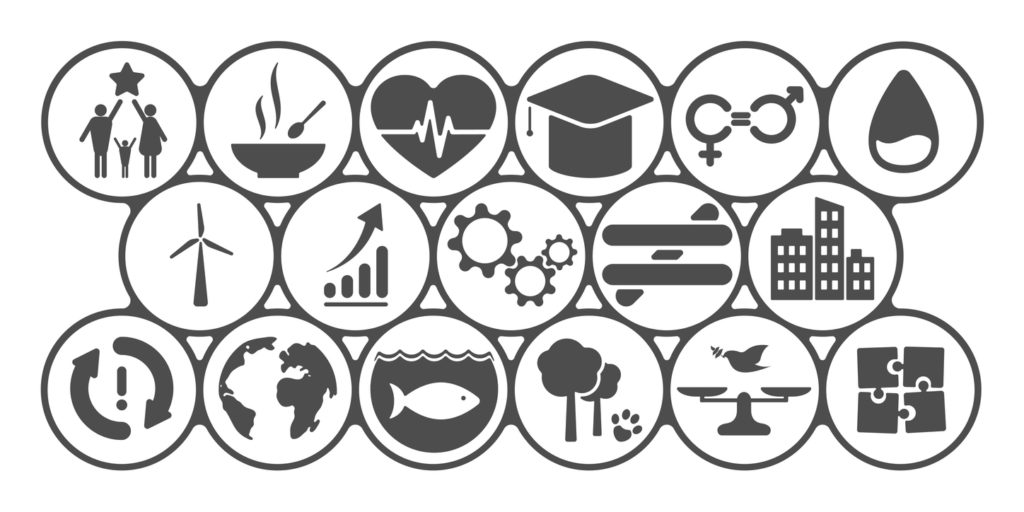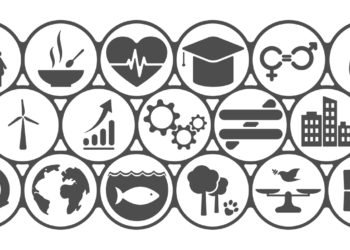In Part 1 of this two-part conversation, Timon Oefelein (Senior Manager, Strategic Partnerships and Outreach, Springer Nature) asked Gerald Beasley (the Carl A. Kroch University Librarian at Cornell University) what libraries can do to help advance the United Nation’s Sustainable Development Goals (SDGs). Now we turn the tables, and Gerald asks Timon what publishers can do to that same end.
Gerald Beasley: What can publishers do to communicate and advocate the SDGs?
Timon Oefelein: The SDGs have an ambitious timeline — and the signs are that it will be very challenging indeed for governments to achieve the Goals by 2030. For there to be a chance of success, collaboration between all sectors of society will be needed. The UN themselves highlighted the important role of publishers when last year – with the International Publishers Association (IPA) they launched the SDG Publishers Compact. The Compact encourages publishers to help inform, develop and inspire action as champions of the Goals, and to develop their own sustainable practices. Publishing is one of only two sectors (the other being the media more generally) called out in this way.
Amongst the most direct ways that publishers can be ambassadors and promote the SDGs are by highlighting SDG-relevant content for their audiences, connecting communities interested in particular Goals, or tackling specific issues that are identified as Target areas within a Goal.
A good example for children’s content is the collaborative project `The SDG Book Club´, a curated list of children’s books that relate to each of the 17 SDGs in six official UN languages, and now also active in Indonesia and Norway.
For policy makers, there is the Food Systems Dashboard, which visualizes complex country-level data of our entire global food systems.
Launched in September, ahead of November’s COP26 climate conference, a special showcase highlights books from a wide range of publishers and aimed at every age and stage, with a focus on SDG13: Climate Action.
Many publishers are now tagging SDG-related content on their platforms, sometimes adding additional resources, or curating events to dig deeper into content and uncover underexplored areas of research.
It’s great to see how, in many different ways, publishers have embraced the adoption of SDG-dedicated content, often highly interdisciplinary in nature, for a number of different target groups.
One area where I think publishers can and should do more, is in experimenting with new formats to ensure that their SDG-relevant content gets to the people who need it most. In the research publishing sphere that includes things like policy briefs, shorter research summaries, and expert elicitations, dedicated to the needs of policy makers and practitioners — all to help researchers get their message across in a more direct way. In 2020 Springer Nature explored this topic with partners the UN Sustainable Development Solutions Network (SDSN) and published this white paper with recommendations.
A solid start to all these activities is high-level commitment to the SDGs, for example, through becoming a signatory to the SDG Publishers Compact.
For a good summary of publisher SDG-related initiatives from across the world, see the IPA report `Publishers and The United Nations Sustainable Development Goals´.

Beasley: How can publishers support researchers engaged in SDG-relevant research?
Oefelein: In addition to publishing SDG content, publishers are also well positioned to help authors reach wider audiences in the post-publication phase.
A good example of how this might be done is our open Sustainability Community platform, where authors and editors share the stories behind their article or book, or new insights and opinions. This gives authors a chance to share their results in a more direct and less formal way, especially with non-scientists.
We also have a role in advocating for science and research with policymakers. The Science on the Hill event series, for example, is geared to helping researchers connect with politicians and their staff. Nature’s Editor-in-Chief Magdalena Skipper recently took this message directly to the UN — calling for science to have a more prominent and explicit role at the General Assembly itself.
One area where there is still a lot of work to be done is helping researchers publish their data openly to aid reproducibility and efficiency. For publishers this means adopting more stringent data policies that mandate publication of a Data Availability Statement as part of the Version of Record. Further, publishers should encourage (and support) authors to cite the data of other researchers and further, practice the FAIR data principles.
Beasley: How can publishers support Open Access (OA) and Open Science (OS) with a view to facilitating the SDGs?
Oefelein: During the COVID-19-crises, the publishing industry quickly united to openly release all Covid-19 related content throughout the duration of the outbreak. Within the first few weeks, over 32,000 items were released and to date, PubMed Central cites more than 50 publishers contributing. This is a very strong response.
Creating sustainable solutions to increase the volume of research on societally important issues that are published in openly accessible formats will be vital to ensuring that research can reach all those who need it. And publishers must continue to offer authors and their institutions around the world as much choice as possible in terms of different types of OA models. There is no one-fit-for-all solution. Different regions are moving to OA at different speeds and in differing ways and so all stakeholders need to keep an adaptive mind-set.
Strategic partnerships dedicated to open SDG-content can be a powerful way to speed up the transition. A good example is the LYRASIS UN SDG Book Publishing Fund announced earlier this year.
Research4Life, through which researchers in lower and middle-income countries can gain free or low-cost access to subscription research content, is working on ways to expand its work to understand how our industry can best enable an equitable transition to open access in those countries. According to this recent White Paper, in 2018, only 16% of authors from Research4Life countries publish their results under a Gold open access model.
Beasley: How and with whom can publishers partner to progress solutions to the SDGs?
Oefelein: In the context of operational sustainability, publishers should adopt goals and best-practices in as many areas as possible. For example, by committing to becoming net carbon zero, by committing to gender equality in senior leadership positions, and by focusing on crucial topics such as anti-racism.
These goals might be synced to both internal codes of conducts and wider community initiatives such as The Climate Pledge or the Joint Commitment for Action on Inclusion and Diversity in Publishing.
To support the pathways to reaching these goals, publishers should hire dedicated staff, with specialist sustainability expertise in areas such as operations, production, HR or purchasing. Staff surveys and internal networks can provide fresh perspectives. A public Sustainability Report sheds light on these goals and allows for regular and evidence-based progress monitoring.
But there is more that can be done and partnerships can be a powerful way to gain even further traction. The Pearson Affordable Learning Fund, launched over 10 years ago for example, invests in companies that build solutions for educational services across Africa, Asia, and Latin America.
I was fortunate to recently participate in a unique publisher-library partnership between Springer Nature and VSNU to advance our understanding of the societal impact of research. Together with libraries, we held several workshops for researchers on how to devise a societal impact strategy.
Looking ahead, one of the most exciting partnership initiatives, in my view, is the Pistoia Alliance, a dynamic R&D forum in Life Sciences. The alliance stimulates and supports pre-competitive collaboration and open sharing amongst companies, start-ups, publishers, practitioners, to facilitate innovation and best practices.
I think that this way of working, let’s call it Open Innovation, has game changing potential as it involves pooling together multiple stakeholders to speed up the pathway from research and publication to tech-transfer and application. It’s also why we must work together to save the world.
Views expressed are the opinions of the author and do not represent endorsement by Springer-Nature.
Discussion
3 Thoughts on "Guest Post — The UN’s Sustainable Development Goals and Open Access: Gerald Beasley Interviews Timon Oefelein (Part 2 of 2)"
“One area where I think publishers can and should do more, is in experimenting with new formats to ensure that their SDG-relevant content gets to the people who need it most. In the research publishing sphere that includes things like policy briefs, shorter research summaries, and expert elicitations, dedicated to the needs of policy makers and practitioners — all to help researchers get their message across in a more direct way.”
“In addition to publishing SDG content, publishers are also well positioned to help authors reach wider audiences in the post-publication phase.”
Another way to help with this that I didn’t see listed here was podcasting and/or video. Both can be great ways to get information in front of people in the format that’s best suited to their needs (i.e. can keep it high level for researchers or distill key points and concepts for interested public listeners). Likewise, since they can listen while they do other things, it can be an easy way for people with busy schedules to keep up in a more passive format. We’ve had a podcast for three years (actually just had an episode on the FAO Strategic Framework) and people seem to really like it so far!
Hi Abby, I agree – podcasts and videos are a very good format for a broader reach. In this context, I can add that we also have the Nature Podcast series, which showcases research from around the world on a weekly basis.
Nice! I’ll have to check it out!


